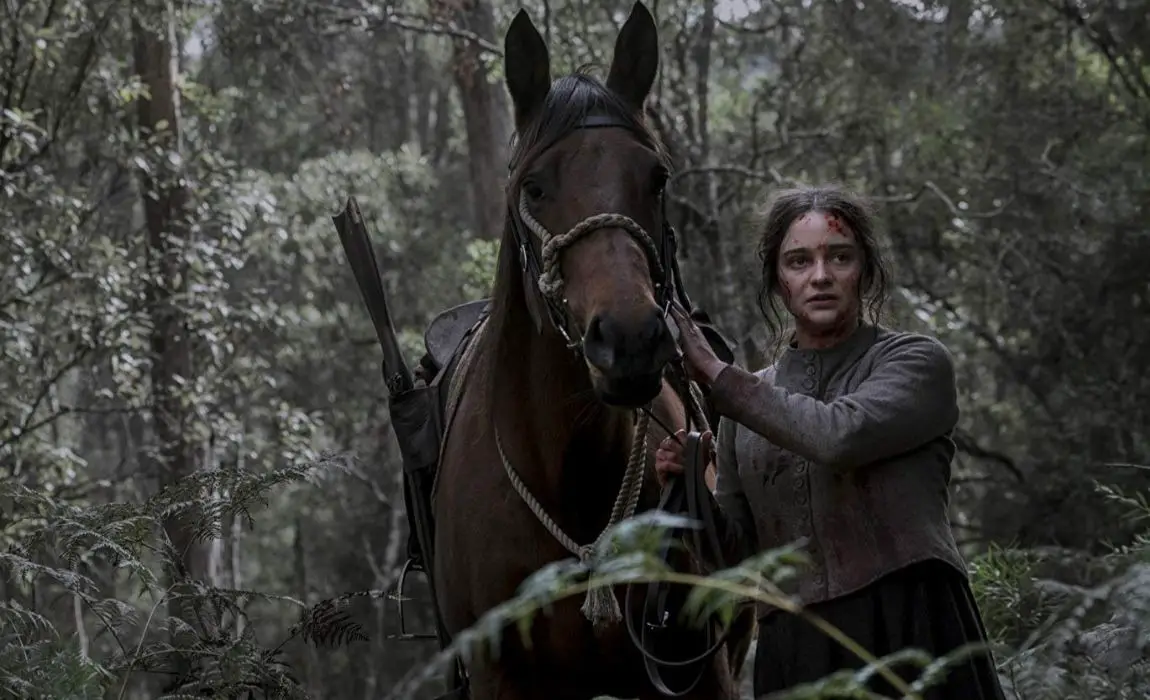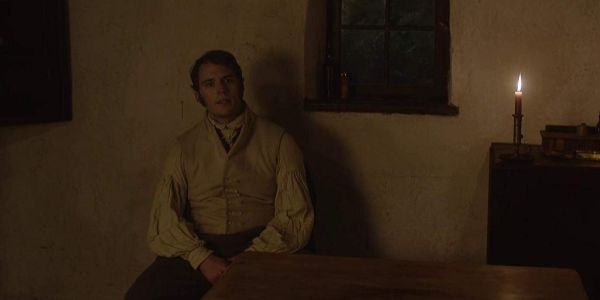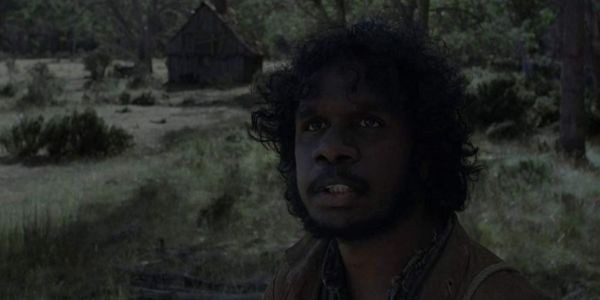Sound Is The Plea In THE NIGHTINGALE

Alex is a film addict, TV aficionado, and book lover.…
The Nightingale made a ruckus during its festival run, grabbing headlines for its relentless, suffocating brutality. People walked out of screenings or gave firm admonishments when it was over, wondering why writer and director Jennifer Kent made such a difficult movie to watch.
The subject matter excuses it, some argued, rightly pointing out that the rapes, murders, and other inhumane acts were all accurate to the period of colonial Tasmania that the film is set in. And yet this isn’t a complete justification, especially as movies across the world are taking the piss out of colonialism in ways both serious and comical. The Lost City of Z shed light on its egotistical downfall, Embrace of the Serpent cast the erasure of indiginous cultures as a waking nightmare, and Zama put the Spanish in their place with an unimpressed llama. But none got the knee-jerk revulsion that The Nightingale experienced, and that’s because what really upset people is not what Kent was talking about but the way she articulated it: through sound, the sound of rage, the sound of human beings breaking, the sound of indifference.
Kent hinted at her storytelling mastery in her debut, The Babadook, but she unleashed it in The Nightingale, using her clout to tell her country’s unreckoned with history and the danger that comes from ignoring it. Her characters are put through the wringer, and despite what people may say, it’s far from the most graphic take on this story we could’ve gotten. Instead she leans heavily on some immaculate sound mixing and editing, allowing that to communicate pain and depravity over the visuals. Watch that scene (you know the one) again and note how the baby’s cries, a noise we’re hardwired to find excruciating, rises and falls. Talk about playing an audience like a fiddle.
This extra attention to sound isn’t simply well-played emotional manipulation, though; it’s the heart of the dilemma she puts in front of her characters: in an unforgiving, maddening world, do you remain open, do you continue feeling the pain of those around you, or do close yourself off. There is no in between, there is no compromise. You listen or you don’t, and as she highlights again and again by making the audience hear everything these characters go through, only one carries the chance of making the world bearable.
The Doom Of Closure

Lieutenant Hawkins (Sam Claflin), at first glance, may seem like evil incarnate. An ambitious officer ruling over a little slice of Tasmania, he refuses to grant Irish convict Clare (Aislling Franciosi) her freedom long after she’s served her time. Her rapes her and many other women, he’s responsible for the death of her husband and baby, and he metes out punishment to his men not for their betterment but to meet his own ends. He is the source of much of the film’s brutality, and while it would be easy to cast him as representative of British colonialism as a whole, there’s something much more personal and much more upsetting behind his actions.
This was highlighted in what was for me the most chilling line of the movie: “I can’t stand the f*cking noise of it.” This is growled by Hawkins after shooting a boy he saw potential in, one who let him down and began crying, pleading for a second chance. The gun fired, the boy fell, and the movie went quiet before he uttered the line. This crescendo of pain and silence recurs throughout the movie, and it’s in this late repetition that it is revealed as a motivation for Hawkins’ actions. It’s not just that he has an end goal and plows through anyone in his way; he’s literally annoyed by the space other people take up in his life, including, even, the time it takes to listen and respond to another person’s pain.
In refusing to listen to others he becomes capable of doing anything to them, and because of this he is doomed to spread horror and, ultimately, to die. The Nightingale is roughly structured as a rape/revenge movie, but like all the familiar pieces it builds itself on, it subtly subverts this. When Hawkins rapes Clare, she recruits an aboriginal guide named Billy (Baykali Ganambarr) to chase after Hawkins to kill him, but by the time they catch up with him the bloodlust is gone. If this was simply about her revenge then the movie would end with their confrontation, which involves no further violence. But The Nightingale has become about much more than her journey at this point. The story has become a question of what to do when caught in a world that refuses to acknowledging another person’s humanity, or, as Billy and Clare put it when contemplating what to do about Hawkins, when they just won’t listen.

They ultimately kill him, but that neither resolves their pain nor is the ultimate solution the film puts forth. That comes from Clare and Billy’s journey together, which strikes a much more optomistic beat.
The Hope Of Being Heard
The pair do not begin as friends. This is 1800s Tasmania, after all, and she is a white woman and he is an aboriginal man. She’s a racist through and through and he (rightly so) is pretty angry at white people for destroying his country. Whatever hope creeps in comes from the unlikely friendship that develops, which yes, hews very close to the treacle, cringe-worthy trope of a white person getting to know a person of color and “curing” their racism. Again, though, Kent is aware of the standard and subverts it, creating not a revelation of equality but a revelation of understood trauma that galvanizes in its own way.

You can see the hand Kent’s playing if you pay attention to the movie’s high points. Instead of hitting you hard with the killing of Hawkins, Kent holds the climax to the film’s final moment, the culmination of a scene that offsets not any of the rape or murders we’ve seen but a fireside exchange almost mid-way through the film. While still prickly and untrusting, Clare and Billy settle in for another long evening. They exchange barbs and eventually begin conversing and singing in their own languages, but instead of taking anything in about each other, they continue dismissing and insulting, and the scene ends with a hard cut to another loud, agonizing rape. The lack of transition is key here; it’s a continuation of the aggression, no tonal shift needed.
Compare that to the final moments of The Nightingale, which sees Clare and Billy staring out at the rising sun. They again exchange songs in their own languages, each in their turn and quietly observing the other. They have ended up in the same place but they are not lamenting the same things, and they are not so wrapped up in their own losses that they ignore the other’s. Instead of a hard cut to sounds of agony, we get a quiet moment of the sun rising and a deep breath in from Clare, one ragged with the weight of the world she’s seen but firm and defiant.
They have made it to an end but haven’t lost themselves. They are still open, still listening, and still able to face whatever comes next.
Does content like this matter to you?
Become a Member and support film journalism. Unlock access to all of Film Inquiry`s great articles. Join a community of like-minded readers who are passionate about cinema - get access to our private members Network, give back to independent filmmakers, and more.
Alex is a film addict, TV aficionado, and book lover. He's perfecting his cat dad energy.













